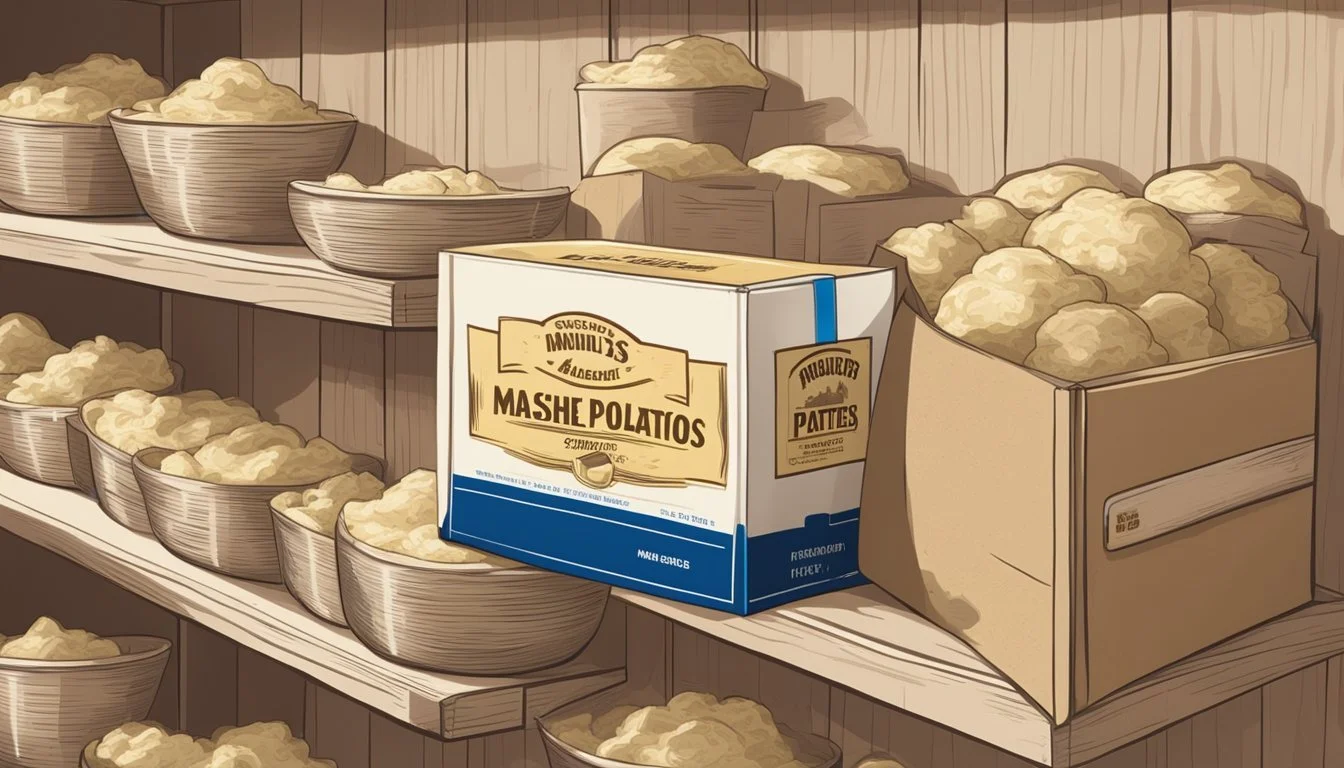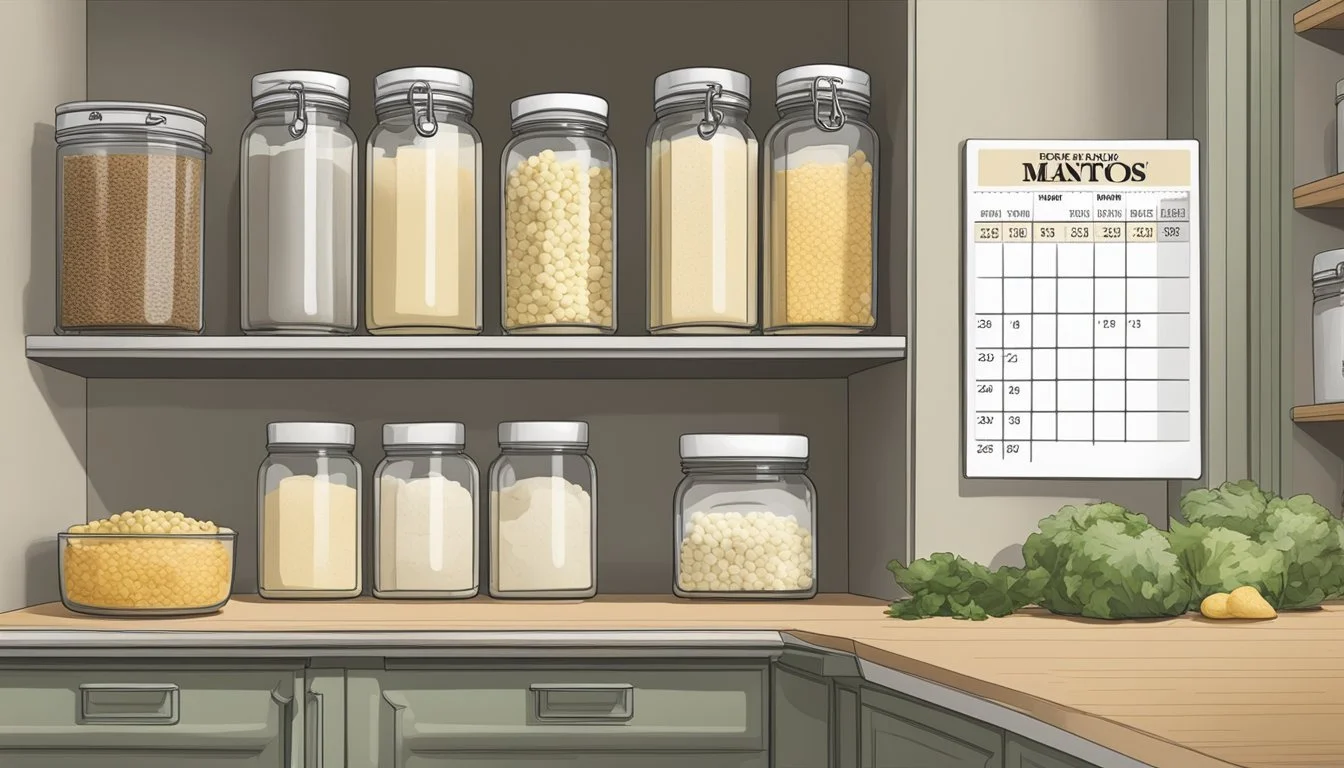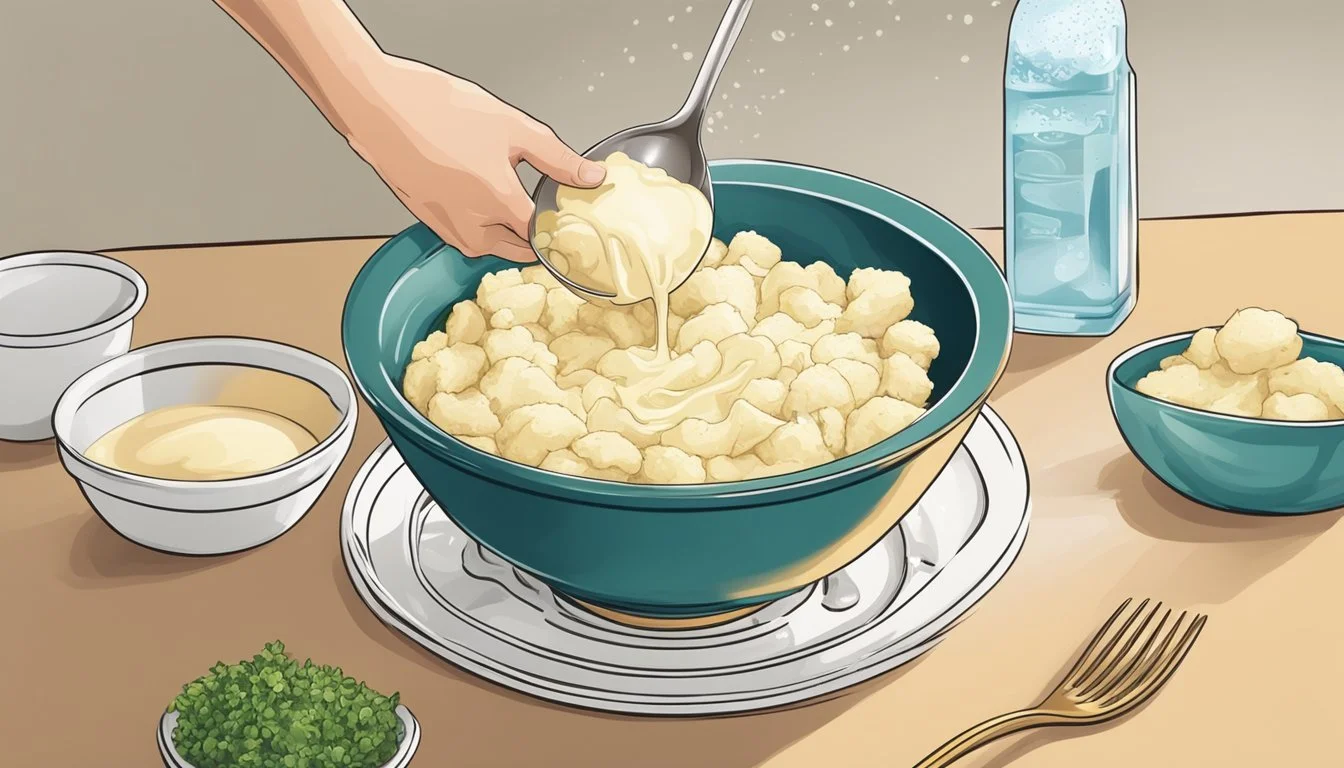How Long Do Instant Mashed Potatoes Last?
Shelf Life and Storage Tips
Instant mashed potatoes (how long do instant mashed potatoes last?) have become a staple in many households, offering the comfort of homemade mashed potatoes with the convenience of a quick preparation time. The shelf life of instant mashed potatoes is an important consideration for consumers looking to enjoy this product at its best quality. Typically, unopened instant mashed potatoes can last for about 6 to 12 months when stored in a cool, dry place. Factors such as the best-by date, the integrity of the packaging, and the consistency of storage conditions play significant roles in determining how long they will retain their quality.
Once a package of instant mashed potatoes is opened, the clock starts ticking on freshness. They should be consumed within a short time frame, optimally within 2 weeks, to ensure quality and taste are at their peak. After opening, any remaining product should be stored properly to maintain freshness. Proper storage means keeping the potatoes in a cool, dry place, sealed tightly to protect against moisture and other contaminants which could accelerate spoilage.
It is crucial to examine the instant mashed potatoes for any signs of spoilage, such as an unusual odor, discoloration, or the presence of insects before preparation and consumption. While they are a convenient and tasty addition to any meal, maintaining proper storage and adhering to shelf life guidelines ensures the safety and enjoyment of instant mashed potatoes.
Understanding Instant Mashed Potatoes
Instant mashed potatoes offer convenience and versatility as a food product. They are a popular pantry staple due to their ease of preparation and long shelf life.
Composition and Ingredients
The primary ingredient in instant mashed potatoes is dehydrated potato flakes (how long does potato flakes last?). These flakes are often accompanied by preservatives to increase shelf life, as well as emulsifiers, stabilizers, and sometimes flavor enhancers. Common preservatives may include sodium bisulfite or BHA.
Product Types and Packaging
Instant mashed potatoes come in various forms, including powder and flakes, allowing for different textures and preferences. They are typically packaged in Mylar bags or boxes to protect from moisture and air, which can degrade the quality over time.
Nutritional Value and Health Benefits
While the nutritional value can vary by brand, instant mashed potatoes generally provide a source of carbohydrates and dietary fiber. They most often lack the higher nutritional values of fresh potatoes but can still be a part of a balanced meal.
Cooking and Preparation Methods
Preparation is simple: hot water or milk is added to rehydrate the potatoes. The product can be used in diverse recipes, such as casseroles and soups, enhancing both the texture and the flavor of these dishes.
Flavor and Texture Profile
The texture of rehydrated instant mashed potatoes is consistent but varies from creamy to grainy, depending on the type and brand. Flavor can be adjusted with additional seasonings and ingredients like butter or cheese.
Role in Meal Planning and Recipes
Instant mashed potatoes serve as a quick side dish but can also be a key ingredient in various recipes. Their neutral flavor makes them an excellent base for flavorful casseroles and thickening soups.
Shelf Life and Storage Fundamentals
When it comes to instant mashed potatoes, understanding their shelf life and how it is influenced by storage methods is crucial for maintaining quality and ensuring food safety.
Shelf Life Overview
Instant mashed potatoes have a shelf life that varies depending on whether the package is open or unopened. Unopened packages typically last about 6-12 months past the best-by date, while opened instant mashed potatoes should be used within 2-3 months to ensure quality.
Optimal Storage Conditions
To maximize longevity, instant mashed potatoes should be stored in a cool, dry place. Storage in an airtight container is recommended to prevent moisture and air from affecting the product’s quality. A pantry or cupboard away from heat sources and light offers ideal conditions.
Impact of Temperature Fluctuations
Stability in storage temperature is important to prevent degradation of the instant mashed potatoes. Frequent temperature changes can lead to condensation and moisture build-up, which in turn may cause spoilage. Storage areas should remain consistently cool to prevent these fluctuations.
The Role of Packaging in Preservation
The original packaging of instant mashed potatoes is designed to protect the product from moisture and air. Once opened, transferring the potatoes to an airtight container can further prolong their shelf life. Utilizing mylar bags with oxygen absorbers can provide additional protection, especially for long-term storage.
Identifying and Preventing Spoilage
When it comes to instant mashed potatoes, ensuring food safety involves being vigilant about spoilage. Recognizing the signs and taking preventive steps are essential to avoid the health risks associated with consuming spoiled food.
Recognizing Signs of Spoilage
Spoiled instant mashed potatoes can typically be identified by visual and olfactory assessments. Signs of spoilage may include:
Mold Presence: Any visible mold growth, which can appear as furry spots of white, black, green, or other colors, indicates spoilage.
Discoloration: Noticeable changes in color from the original product suggest degradation.
Off Smell: A sour or unusual odor is often a clear indication that instant mashed potatoes should not be consumed.
Texture: A slimy or excessively sticky texture can be a sign of bacterial growth.
Health Risks of Consuming Spoiled Products
Eating spoiled instant mashed potatoes can lead to a range of health risks such as:
Food Poisoning: Symptoms may include nausea, vomiting, diarrhea, and abdominal pain.
Foodborne Illness: Serious illnesses like botulism can occur if bacteria have grown in improperly stored potatoes.
Preventive Measures Against Contamination
To minimize the risk of spoilage and subsequent health risks:
Storage: Keep instant mashed potatoes in a cool, dry place and in an airtight container after opening.
Utensils: Ensure that utensils used are clean and dry to prevent introducing moisture and bacteria.
Food Safety Practices: Follow proper food safety practices, including regular handwashing and keeping surfaces clean.
How to Tell If Mashed Potatoes Have Gone Bad
Observation is key in identifying if instant mashed potatoes are no longer good to eat:
Mold and Color: Check for any visible signs of mold or significant changes in color.
Odor: Sniff for any off smells that differ from the product's typical aroma.
Flavor: If the smell seems fine, a small taste-test (without swallowing) for any off flavors may be necessary, but this should be a last resort, done with caution.
Maximizing Freshness and Quality
Instant mashed potatoes, when stored correctly, can remain fresh and retain their quality from the date of manufacture through to the consumption. Proper storage methods vary depending on whether the package has been opened or not, and if refrigeration or freezing is applied to extend its shelf life.
Best Practices for Unopened Packages
Unopened instant mashed potatoes should be kept in a cool, dry place such as a pantry. To ensure peak quality, adhere strictly to the best-by date on the packaging. A consistent temperature of about 40°F (4°C) is ideal to maintain freshness and flavor.
Handling Opened Instant Mashed Potatoes
Once opened, transfer instant mashed potatoes into an airtight container to protect them from moisture and other contaminants. Store the container in a cool, dry place and aim to consume the potatoes within 2-3 months for the best quality.
Extending Shelf Life Through Freezing
To extend the shelf life of instant mashed potatoes, freezing is an effective method. Store leftovers in a freezer bag or an airtight container to preserve quality. While they can last up to 10-12 months, for optimal flavor, it's best to consume them within 2-3 months of freezing.
Ensuring Quality in Reheating Practices
Reheating frozen or refrigerated instant mashed potatoes should be done carefully to maintain flavor and texture. Thaw in the refrigerator if frozen, and reheat on the stovetop or in the microwave, stirring occasionally to keep the consistency even and flavorful.
Precautions to Maintain Nutritional Value
Avoid repeated temperature changes and exposure to air, which can degrade the nutritional value of instant mashed potatoes. Always seal tightly and store immediately after use to minimize health risks and preserve freshness.
Influence of Dairy and Additives on Shelf Life
The addition of milk, butter, or other dairy products to instant mashed potatoes can impact their shelf life. Refrigeration becomes necessary, and consumption within a few days is recommended to maintain quality. Preservatives in the product can extend its shelf life but always check packaging for specific storage guidelines.
Handling and Usage Directions
When handling and preparing instant mashed potatoes, it's essential to follow guidelines to ensure optimal quality and safety. Understanding the proper methods for cooking, storage, and reheating can significantly impact the shelf life and taste of your instant mashed potatoes.
Instructions for Cooking
For cooking instant mashed potatoes, one should adhere to the specific instructions on the packaging to achieve the best results. Recipes may vary, but generally, they will require boiling water, milk, or a combination of both, along with butter or another fat. Stirring the mixture into the dry potato flakes until they reach the desired consistency is standard practice.
Boil the recommended amount of liquid (water, milk, or a mixture).
Add fat such as butter or margarine, as per the instructions.
Remove the pot from heat, pour in potato flakes, and stir until well mixed.
Storage Tips After Opening
Once a package of instant mashed potatoes has been opened, they are prone to moisture and other contaminants that could shorten their shelf life.
Store leftovers in an airtight container within the refrigerator to maintain quality.
Refrigerator: Leftovers should be consumed within 2 weeks for best quality.
Avoid leaving instant mashed potatoes at room temperature for prolonged periods to prevent bacterial growth.
Thawing and Reusing Frozen Instant Mashed Potatoes
Instant mashed potatoes can be frozen, extending their usability beyond the typical pantry shelf life.
To freeze leftovers, first allow them to cool, then transfer to a freezer bag, squeezing out as much air as possible.
Label the freezer bag with the date to keep track of how long they have been stored.
When ready to use frozen instant mashed potatoes, thaw them overnight in the refrigerator or reheat directly from frozen.
For reheating, ensure the potatoes are heated all the way through. Reheating can be done:
In a saucepan over low heat, stirring frequently.
In the microwave, using a microwave-safe dish, and stirring periodically to ensure even warming.
Remember that repeated freezing and thawing cycles can impact the texture and flavor of instant mashed potatoes. It's recommended to freeze and thaw only once. In cooking, they can be incorporated into various recipes, such as casseroles and soups, as a thickener or ingredient.
Frequently Asked Questions
When it comes to instant mashed potatoes, consumers often have questions regarding shelf life, storage, and quality. This section addresses some of the most common queries.
Common Concerns About Instant Mashed Potatoes
Shelf Life and Freshness: Instant mashed potatoes typically have a best-by date indicating their peak quality. An unopened package can last for approximately 6-12 months in a cool, dry area. Beyond the best-by date, they may still be safe to consume if there's no evidence of spoilage, which includes an off smell, change in color, or any signs of mold.
Food Safety: To ensure food safety, consumers should inspect packages for damage or infections. If signs of insects or pests are found within the packaging, the product should be discarded to prevent food poisoning.
Exploring Alternatives to Instant Mashed Potatoes
If freshness or shelf life are concerns, consumers can explore making mashed potatoes from fresh potatoes. This not only often delivers a better taste but also allows for more control over the ingredients and recipes used. Fresh mashed potatoes can be stored in the fridge for a few days or frozen for longer storage.
Dealing with Package Damage or Infestations
In the event a package of instant mashed potatoes is damaged or shows signs of infestation, it's crucial to discard the product to prevent the risk of food contamination. Storage in a sealed container, away from moisture and pests, is key to prevent such issues.
Conclusion
Instant mashed potatoes offer a convenient shelf-stable option for quick and easy meal preparation. When considering the shelf life of these products, distinct guidelines aid in preserving the quality and safety of the potatoes.
Unopened instant mashed potatoes typically have a longevity that can stretch from 6 to 12 months beyond their best-by date when stored in a cool, dry place. Once the seal is broken, the shelf life reduces and it is advisable to consume the product within 1 to 3 months, depending upon storage conditions.
To maximize freshness, adhere to the following storage recommendations:
Temperature: Maintain consistent, cool temperatures, avoiding areas with temperature fluctuations.
Container: Once opened, transfer instant mashed potatoes to an airtight container.
For quality assurance, users should visually inspect and smell the product for signs of spoilage such as:
Discoloration: Any changes from the original color may indicate degradation.
Odor: An off smell is a clear indicator that the potatoes should not be consumed.
Texture: Any unusual texture suggests that the instant mashed potatoes may not be at their best quality.
Proper storage is essential to extend the shelf life and ensure the instant mashed potatoes remain a reliable pantry staple. Consumers should always check for signs of spoilage before use to ensure the product's safety and taste.









